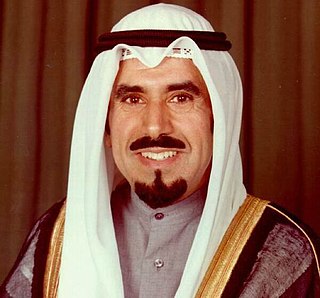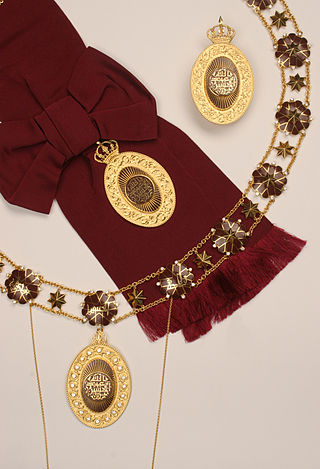
Sheikh Jaber Al-Ahmad Al-Jaber Al-Sabah or Jaber III was Emir of Kuwait from 31 December 1977 until his death in 2006.

The Order of the Nile was established in 1915 and was one of the Kingdom of Egypt's principal orders until the monarchy was abolished in 1953. It was then reconstituted as the Republic of Egypt's highest state honor.

The 1964 Arab League summit was the first summit of the Arab League, held in Cairo, Egypt, on 13–16 January 1964 and attended by all fourteen of the then member states: United Arab Republic (Egypt), Iraq, Lebanon, State of Palestine, Syria, Saudi Arabia, Jordan, Yemen Arab Republic, Libya, Sudan, Morocco, Tunisia, Kuwait and Algeria.

The 1964 Arab League summit in Alexandria was held on 11 September 1964 in Montaza Palace, Alexandria as the second Arab League Summit. The focus of the conference was to implement the plans discussed at the first Arab League summit held in January of that year. The summit was notable for being a key step in the buildup to the Six-Day War in 1967 and separately for "approving the establishment of the Palestine Liberation Organization."

The Order of the Star of Jordan or The Order of Hussein ibn Ali is an award and order of Jordan and is awarded for military or civil merit.
The Most Exalted Order of the Crown of the Realm is a Malaysian federal award. It is ranked lower than the Order of the Royal Family of Malaysia.

Sabah Al-Ahmad Al-Jaber Al-Sabah was the Emir of Kuwait from 24 January 2006 until his death in 2020.

Hussein, King of Jordan, died at 11:43 (AST) on 7 February 1999 at the King Hussein Medical Center in Amman, at the age of 63. He was succeeded by his eldest son, Abdullah.

The Order of al-Hussein bin Ali is the highest order of the Kingdom of Jordan. It was founded on 22 June 1949 with one class by King Abdullah I of Jordan with the intended recipients being foreign heads of state and senior royals.

The Supreme Order of the Renaissance is the second-most senior order of merit in the Kingdom of Jordan.

The Order of Independence is the fourth knighthood order of the Kingdom of Jordan.

The Sultanate of Oman has created these orders of knighthood. In chronological order:

The Order of Oman is the second highest order of Oman.

Haitham bin Tariq Al Said is Sultan and Prime Minister of Oman.

The Royal Family Order of the Crown of Brunei is an order of Brunei. It was established on 15 August 1982 by Sultan Hassanal Bolkiah. The order carries the post-nominal letters "DKMB".

Mishal Al-Ahmad Al-Jaber Al-Sabah is Emir of Kuwait, reigning since 2023. Mishal spent most of his career in Kuwait's security and intelligence apparatus. Prior to becoming Emir at age 83, he was the oldest crown prince in the world.
The Order of Sheikh Isa bin Salman Al Khalifa is a Bahraini order of merit. It is the highest decoration in the Kingdom of Bahrain and is named after Isa bin Salman Al Khalifa, the former Emir of Bahrain.
The 2022 Arab League summit, officially the 31st Ordinary Session of the Council of the League of Arab States at the Summit Level, was held at its 31st session in Algiers. This was the fourth time the city hosted this event. All Arab countries were represented at the event, with the exception of Syria, which has been suspended since 2011 due to the ongoing crisis. The summit was postponed several times before its date was confirmed on 1 November 2022. It was initially to be held in 2020, 2021 and finally March 2022. But due to the COVID-19 pandemic, it was postponed to November to coincide with the anniversary of the outbreak of the Algerian Revolution. The summit was also the first since a number of countries normalized relations with Israel, causing a schism in the Arab position, which had remained united over what was stipulated in the Beirut 2002 initiative.














